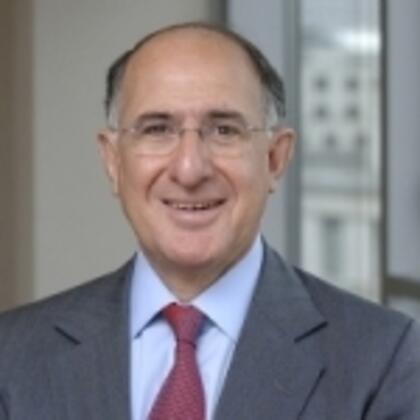The New Normal: Rebalancing Our Priorities
Share
- Details
- Transcript
- Audio
- Downloads
- Extra Reading
It is time for the banking and financial sectors to stop apologising and start changing. But how?
Professor Costa outlines three key themes for change needed in order to estable a "New Normal" for how we operate in the commerical and financial world: a re-ordering of our priorities, the respect the ethical, and the creation of a better spirit in which to carry out business.
Download Transcript
17 April 2012
The New Normal:
Rebalancing Our Priorities
Professor Ken Costa
Bob Diamond has an ability to capture newspaper headlines in a way that I suspect he wished he didn’t.
Group Chief Executive of Barclays Bank since 2011, Mr Diamond has suffered the limelight a great deal since the crash of 2008-09, despite the fact that Barclays was one of the few banks that did not have to go cap-in-hand to the government. He has been widely quoted but is perhaps best known for a comment made before the cross-party Treasury Select Committee in January 2011. He said (I quote): “there was a period of remorse and apology for banks – [but] that period needs to be over. We need banks to be able to take risk, working with the private sector in the UK.”
I think it is fair to say that the reaction to this across the UK was not entirely positive. In fact, Mr Diamond was widely criticised. However, what many people who took it upon themselves to criticise him seemingly failed to realise was that he was far from alone in holding that opinion.
Jamie Dimon the head of JP Morgan made the same plea in a talk to the World Economic Forum in Davos at around the same time, and was widely applauded by his peers for saying so.
Terry Leahy, the now former chief executive of Tesco and one of the most successful businessmen of our generation, told The Daily Telegraph that he feared that Britain was taking wealth creation for granted.
John Cridland, Director-General of CBI, has repeatedly said that Britain needs successful and growing companies and that it’s vital that international corporations are based in the UK because, without them, the whole country is the poorer. “We should be championing [business] people — not attacking them,” he said.
Indeed, no less a person than the Prime Minister has said that the banks have become an “easy scapegoat” for the economic crisis. In other words, for all the personal opprobrium heaped on him, Bob Diamond was voicing a reasonably widespread and, to my mind, a perfectly defensible position.
I would like to set my stall out on this issue straightaway and say that that, as far as this argument is concerned, I am firmly on the side of the Prime Minister, and John Cridland, and Terry Leahy, Jamie Dimon, and Bob Diamond. I do fear that there is an anti-business and particularly an anti-banking ethos in the country at the moment, which is harmful to the interests of commerce. And I do think we need to move away from it. However, having said that, I am nervous about the phrase “there was a period of remorse…that…needs to be over”. Because this, at least superficially, appears to suggest that remorse – a fundamentally moral response to a morally-loaded problem – should be limited to a specific period of time, and that we can, in effect, go back to the old normal, to the way things were. And that, I think, is misleading.
We should be under no illusion about what we have just been through, indeed, what we are still recovering from. The financial crash was no ordinary blip, no ordinary cyclical downturn. It was truly epochal, seismic in fact, bringing the entire Western economy to the very brink. Until we truly let go of the ancient financial regime, it will be impossible to imagine and create a new paradigm for commerce.
If there is one message that I have been trying to articulate in this series of Gresham lectures, it is that finance needs to reconnect with its ethical foundations. It cannot survive outside a moral framework. The crash was a painful example of what happens when it does.
We do indeed need to move on, if only because becoming fixated on the past will prevent us from tackling the future. But we will not be able to tackle the future by ignoring the mistakes of the past.
In other words, we need to go – not back to normal, but forwards, to the New Normal. And we need to do so by re-ordering our priorities.
This is the subject of my lecture tonight.
I want to unpack tonight what I mean by the new normal – what it consists of and what we need to do to get there. I want to begin by rehearsing one of my central arguments in these lectures: what it means to be human.
During this series, I have repeatedly emphasised that humans are composite beings, a mixture of different aspects. In particular, we are a composite of the financial, of the ethical and of the spirit. What do I mean by each of these?
Briefly, the financial aspect is to be found in the fact that we want to do well.
It is in our nature to earn money, to prosper, to want to live in comfort. There is the invisible hand steering us to beneficial profitable behaviour, and there is nothing to be ashamed of in the desire to make money and do well. Indeed, there is a moral imperative to create wealth. The shame comes when this aspect of our human nature eclipses all others.
In particular, when it eclipses the second aspect of human nature, our nature as ethical beings. We want to do good as well as doing well.
On this note, and just as an aside, it is quite right that so many people are up in arms about the government’s plans to cap charity tax relief. You simply cannot siphon off the “doing well” part of human nature from the “doing good” part, and expect them both to continue to prosper.
Whatever the motivations for this may be, the impact of this policy will be to deter philanthropy. As the Chief executive of the Charities Aid Foundation John Low had said, “generous philanthropists across the country are demoralised by being branded tax-dodgers.”
So, there is a financial element and an ethical element, both of which are fundamental to human nature.
But there is also the element of the spirit.
Now I need to be very clear what I mean by this.
By ‘spirit’ I do not narrowly mean ‘spiritual’ or ‘religious’ – although both of those can be included in the term.
Rather, I mean spirit in a broad and inclusive way, using the word in the same way as when people talk about the ‘spirit of an age’, or doing something ‘in the right spirit’. What I mean is the zeitgeist – the prevalent cultural intellectual and spiritual ambiance of our society.
That spirit may be hedonistic or ascetic; selfish or generous; short-term or long-term; rationalist or emotional; reserved or outgoing – or some combination of all of these. The important thing to realise is that no culture, no society, no individual is neutral or objective in such matters. We are all of us informed and animated by a particular spirit.
It is my hope that the spirit of our age will be both entrepreneurial and responsible; a spirit of rationality and of morality; a spirit of intelligent reflection and of intuition. In short, a spirit in which there is a better balance, a better rhythm, to life.
But I am running ahead of myself a bit.
My key argument tonight is that, having recognised this diverse but linked aspect of human nature, we need to rebalance our priorities so that we pay serious attention to each different aspect.
So, let’s begin with the financial aspect. What does the New Normal look like here? How do we reorder our financial priorities? We need an unapologetic attitude that generating wealth is a good: a renewed emphasis on commerce, investment and entrepreneurship.
So, firstly, what does this mean for government?
I need hardly remind you that the UK remains in a perilous financial position. Many people are feeling economically insecure, none more so than the young. In the three months to January this year the unemployment total for 16-24 year olds rose by 16,000 to 1.04 million and currently stands at a staggering 22.5%. We are in grave danger of losing an entire generation to joblessness and all the social and psychological problems that come with it.
The brute fact here is that only business can create the jobs that these people need. To its credit, this government clearly recognises this and has sounded many pro-business notes over the last two years. More importantly, it has made a number of pro-business moves.
Government sponsored job training and creation schemes, for example, have certainly helped. Similarly, reducing regulatory complexity and the rates of tax for small enterprises, and cutting corporation tax are important measures. But government also needs to do more in providing funding for infrastructure projects, reducing red tape, and making it easier for business to hire and, if necessary, fire employees.
In particular, we need to take a new approach to the question of lending to SMEs. Business is the only sustainable solution to our problem of joblessness. Business lending, therefore, becomes absolutely crucial. Regrettably, the level of SME lending has been woefully inadequate over recent years. This is a prime example of where government can intervene, by making direct equity loans to small businesses.
Some may protest that this would be an example of government getting involved where it shouldn’t. However, given that recent years have seen government “get involved” in the financial sector on an unprecedented scale (without generating the growth needed for a sustainable recovery), I don’t think it is at all illegitimate for it to do the same, on a much smaller scale, when it comes to priming business.
We need to avoid debt-fuelled growth for SME’s. A new paradigm is needed of direct government involvement in the provision of growth equity for SME’s.
This leads me on to my second point in this section: education.
Sir Terry Leahy’s observations are relevant at this point. Sir Terry, in case we forget, oversaw the creation of over 300,000 jobs when he was running Tesco and, moreover, gave employees shares and increased their salaries in real terms over the period. If anyone knows about creating jobs in the British context it is him.
Yet, he has remarked that, as far as he is concerned, all people are taught about business is dark the “satanic mills and fat cat bankers” line; business-as-problem rather than business-as-solution. In contrast to this, he has said, a respect for business and wealth creation needs to be taught at schools. Business should be a prominent part of the curriculum. If courses in business and commerce were integrated into the syllabus it would help build the bedrock of understanding that would massively benefit future generations.
Thirdly, this is also a media issue.
Far be it from me to suggest that certain sectors of our media are captured by the received anti-business wisdom of the age, but I do wonder, for example, how many people know how many private sector jobs have been created over this duration of this parliament to date.
The answer is around half a million.
This is very good news. It’s not good enough, but it is certainly a step in the right direction. However, there has been little celebration of this, or analysis of how or why they came about in an economy that was ostensibly flat-lining. It is certainly not the job of the media to cheerlead for the government. But the fact is that just as schools and colleges have a role in educating the public about the mechanics and aims – and successes – of business, so does the media.
A fourthand final point, is our attitude to finance.If our cultural attitude to business and investment is poor, our attitude to banking and finance is truly lamentable. According to one survey last year, twice as many people said that investment banks do harm to the UK economy as think they benefit it. If we don’t love business much as a nation, we certainly don’t love finance.
James Dyson, the British engineer and entrepreneur, makes an interesting example here. He told the Daily Mail last summer that bankers are guilty of “an extreme perversion of capitalism”. That makes a good headline and encourages those who hardly need any encouragement to give banks a good kicking.
But that is, at best, a partial view of Dyson’s view of bankers. Elsewhere he has written how:
“Dyson vacuum cleaners would not exist were it not for Mike Page, my bank manager, who personally lobbied an initially reluctant Lloyds Bank to loan me the £600,000 I needed for tooling – the only way to start out on my own… it’s clear: for UK technology to thrive, financial support is required: lenders and investors with patience and risk-tolerance.”
This is a great example of how finance should and does work – and how it should be celebrated.
That is not to say that it always works like that. Dyson went on to lament how “too often, UK investors are reluctant to take a punt on technology, science or engineering… and banks shy away from innovation.”
What it is to say is that when finance does what it should do – oiling the wheels of commerce; making adequate, risk-adjusted returns for shareholders; providing an efficient service for all stakeholders – when it does that, then we need publicly to recognise and to celebrate it.
These points, then, collectively make my overarching argument about how we need to re-order our financial priorities: government needs to do, as well as say, more to get business activity going; the education system needs to pay much more serious attention to teaching what business is and what good it can do; the media needs to be less hostile and more encouraging about business activity; and the true role, significance and benefit of the finance sector needs to be publicly recognised and celebrated.
Doing all this is necessary if we want to move on to The New Normal, but it is not sufficient. And this leads me to the second point of my argument.
Business is part of wider society, not isolated from it. Accordingly, it cannot divorce itself from the moral universe in which we all operate.
Matthew Hancock and Nadhim Zahawi put this well in their book on the financial crash, ‘Masters of Nothing’. They say:
“Businesses do not act in a moral vacuum. They are made up of human beings who all play their role in society. Like any other group of people, business leaders need to take responsibility for their actions – right or wrong. Whether legal or not, immoral actions within businesses should not be ignored just because there’s a logo on the door.”
What does this mean in practical terms?
The first thing it means is changing the terms of the debate, or more precisely recognising that the terms of the debate must include moral terms. We can no longer allow technical complexity to evict the moral perspectives from the debate. For far too long, too many people have mistaken complexity for progress, believing that complex algorithms, reams of data, and mind-bogglingly confusing products are all that we need. Progressive innovation has become a self authenticating justification in itself.
It is instructive that when Pricewaterhouse Coopers went into Lehman Brothers after it collapsed in 2008, it took teams of ten people about ten days to start to understand actually what products they were dealing with. That’s not “understand what deals that Lehman had actually done”. It’s ‘understand what products’ they were dealing with in the first place.
That may be an extreme example but it is symptomatic of a wider problem.
The wider world before the crash was mesmerised by cyber solutions, the idea that computers could do all that was needed. And computers, lest it needs saying don’t lend themselves to ethical discourse.
The first point here, then, is simply to say that the New Normal must re-introduce ethics into the conversation. That may make some people nervous but so be it. In the long run, excluding morals is disastrous.
Second, and attendant on this, if we are serious about our need for ethics, we need to be serious about the ethical terms of our debate. A morally-drained language will not serve us well.
What I mean here can be put in concrete terms. I am talking about talking about ‘fellow-feeling’, ‘responsibility’, ‘reciprocity’, ‘obligation’, ‘honour’, ‘duty’, ‘fairness’, ‘trust’, ‘thrift’, and the like.
Most people are perfectly happy with some of these terms, words like ‘responsibility’ and ‘trust’. Nonetheless, it is a feature of our age that, in as far as we are confident using moral language, we are confident using it in the private sphere, at home, with family, among friends. We tend to be more uneasy about using such terms in public, risking accusations of preaching, moralising or hypocrisy. We take easily to a kind of liberalised utilitarianism, in which people can do whatever makes them happy provided it does not harm anyone else. But this is not good enough. It is a social benefit system, not a moral framework for our time.
That doesn’t mean we should bang on about ‘faith, hope and charity’ in board meetings. There are clearly some morally-freighted terms that are better suited to other realms of life. But it does mean that we need to recapture a once-rich moral vocabulary, in which people feel comfortable talking about decency, honour, fidelity and respect.
A third point: If we are serious about bringing morals into the financial arena, we need to do it early and we need to do it well. Just as we need to teach more business at school, we need to teach more ethics in business school, not simply as a bolt-on to the ‘serious’ business of making money, but as a central and vital part of learning what it is to do business. This sounds ambitious but it is far from impossible. I find the example of Michael Sandel instructive here. Sandel is Professor at Harvard University. Not only is his course on Moral Reasoning the most popular course on in Harvard’s history, but his lectures, books, radio and TV programmes have been watched and read by millions outside the lecture hall.
What Sandel shows is that not only is there a hunger for this kind of ethical engagement with public – indeed with business issues, but that it can be done well – and not as an additional extra to the kind of lives we normally lead but as part of those lives. We need more Michael Sandels for the business world, embedding ethical thinking into the very marrow of our business lives.
Fourth, if we are going to re-order our priorities in favour of ethical thinking, we need to embed morality within our regulation. This doesn’t mean that regulation should talk about decency and honour. Rather, it means that questions of trust and responsibility, for example, are as relevant to regulation as they are to personal relationships.
If the development of the Office for Budget Responsibility is anything to go by, this is clearly on the agenda for our time. Indeed, reforming corporate governance to place a greater emphasis on responsibility is one of the more positive messages to come out of the crash.
Hancock and Zahawi emphasise this in their book, placing particular emphasis on the need for public protagonists to hold boards to account, to strengthen the role of non-executive directors, and to punish those managers and directors for particularly egregious example of irresponsibility.
The specific details of the nature of this kind of moral regulation need not detain us here. The key point is the headline one: for the financial system to be sustainable and to regain public credibility, it has to be – and to be seen to be – ethically legitimate, obeying the same moral strictures and conventions as the rest of society.
Fifthly, and finally here, however, as I have already said, ethics is too important to be left to the regulators. Indeed, if the events of recent years have told us anything it is that good regulation, whether technical or even moral, is no substitute for good behaviour.
Here is where we would benefit from a clear understanding of the difference between written and unwritten rules. The former are pretty much self-evident, ethics passed into regulation or legislation, so as to shape a system to the good.
If we are not careful, however, we can place so much emphasis on the former that we actually strangle the latter, the latter being “society’s unwritten rules of responsibility and ethical behaviour.”
If that sounds vague, it needn’t. If you think about any aspect of your life – whether it is how you behave at home, or at work, or in public, or in any club you belong to, or on public transport – you will realise that most of what you do is governed not by laws but by unwritten rules; silent codes of conduct that you just pick up.
In actual fact, public transport is a good example here. A generation or two ago, people naturally stood up for the aged or infirm. They didn’t eat smelly food, didn’t put their feet on their chairs, and didn’t play their music too loud. There weren’t any specific laws that told them not to do these things. They were just the social norms of the age. Today, public transport operators like London Underground feel it is necessary to tell people not to do these things by means of large signs and posters they put up on buses, trains and tubes. The posters are not wrong in themselves, no one could argue with their basic sentiment: respect other people. The problem is that we seem to be moving from a culture of unwritten rules towards a culture of written ones. And while the intention may be good, the result is expensive, inefficient and ultimately inadequate. You cannot legislate people into civility and decency. Rather, you have to create a culture in which such behaviour is normalised.
Encouragingly, policy makers are more and more inclined in that direction, talking about “social norms”, those standards and patterns of behaviour that become normalised through an organisation or a culture or society without anyone actually having to legislate or regulate for them.
Quite how one generates ‘social norms’ and engenders a culture of moral responsibility is, of course, a huge and contentious issue. I have touched upon it on occasion in this series of lectures, as it involves a number of things that are very important to me – questions of leadership, of vision, of values, of communication.
But however one does, it is critically important that we recognise that good regulation, even if morally grounded, is not enough. We need an explicit emphasis on morality in business and we need to embed moral discretion within the system. This, then, is the second element to the New Normal: prioritise the ethical by talking ethics and embedding it within the system, both in terms of regulation, corporate culture and individual behaviour, in such a way as enables and encourages morally-responsible activity.
What about the third area of reprioritisation – the question of the spirit?
There can be little doubt about what kinds of spirit has animated the economic world for many years of late. They are the spirit of rationality and the spirit of self-centredness.
Rational choice theory, which states that people will elect to maximise personal advantage if given a free and informed choice, was the basis on which we all worked. This, in turn, was the foundation for the efficient market hypothesis, which states that the market price for an asset is the best possible predictor of its price in the future, because all information is distilled into that price.
Given these foundations, there was no need to ask any deeper questions about whether it was right, still less whether it corresponded to reality. People were rational. Information was available. Calculations were made. Prices reflected this. And the system worked. End of story.
The sad fact, we now know, is that it wasn’t the end of the story.
These convictions themselves were the culmination of years in which the traditional discipline of economics, which emerged as moral science, was abandoned in favour of imagined objectivity, where people turned economics into mathematics (or at least tried to). Now, there is of course nothing wrong with mathematical rigour and computing power. But it is not a substitute for careful thought nor, crucially, for a realistic assessment of human nature. Put bluntly, no matter how subtle and complex your algorithms are, if you put garbage in, you get garbage out.
The spirit that animated this model was quite simply wrong. First and most obviously in this context “we are not always rational”. Indeed, anyone who thinks that humans are naturally and always rational creatures really hasn’t spent much time with them! Thankfully, in response to this realisation, a whole new discipline has emerged: behavioural economics, behavioural finance, behavioural politics – basically anything behavioural, anything that is based on how we actually do behave rather than how we think we do, or how we think we ought to.
The result is the revelation – at least it has come as a revelation to some – that the rational spirit that had underpinned so much of our thinking and activity over recent decades is wrong or, at very least, inadequate.
All of us at some time or another misperceive risk, being unable to calculate the true extent of the chances we take. All of us have a tendency – of which we are blissfully unaware much of the time – to favour evidence that confirms our existing biases. All of us have a tendency to go with the crowd, and are yet capable of deluding ourselves that our decision is one of courageous autonomy. All this has helped refashion the spirit of the age, at least in economic thinking, away from the rational spirit and towards the “animal spirit”.
This phrase, at least as it is used in economic thought today, derives from John Maynard Keynes’ discussion in The General Theory of Employment, Interest and Money.[1] This idea has been picked up recently, most prominently in a book entitled Animal Spirits: How Human Psychology Drives the Economy, and Why It Matters for Global Capitalism by George A. Akerlof and Robert J. Shiller.
Akerlof and Shiller argue that it is “animal spirits” – irrational, instinctive, unplanned and often harmful forces within human nature – which actually drive financial events worldwide and that, accordingly, governments cannot simply leave things to the market.
I have said elsewhere in this series that while I welcome the turn from rational, mechanistic spirit towards the animal spirit, I also believe it is itself misleading and unduly pessimistic. We may be driven by animal spirits but we are also driven by a moral and relational spirit – the idea that we are capable of rational reflection, no matter how instinctively driven our psychology is, and that that rational reflection leads us to a sense of human flourishing in which our doing well is inexorably tied up with our doing good with and for others.
It should, I hope, be obvious that my emphasis on the importance of ‘spirit’ in reordering our priorities is not some kind of ‘spiritual’ distraction from the real world of finance or ethics, but rather that it is inextricably tied up with both. If we have an understanding of the human spirit in which humans are wholly rational, when we aren’t, we are setting ourselves up for big problems. If we have an understanding of the human spirit in which humans are purely self-interested, we are creating for ourselves an unduly individualistic and selfish society. Conversely, if we have an understanding of the human spirit in which humans are little more than animal spirit, driven wholly by emotions and instincts that are subconscious, then we are doing an equal disservice to what we are capable of.
Alternatively, if we see the human spirit as I believe it really is: creaturely and not autonomous; dependant, not self-sufficient; relational, not individualistic; moral, not mechanical; unique, not mass produced; accountable, not self-regulating; significant, not pointless; eternal, not temporal – if we can capture this vision accurately, we stand a much better chance of reaching the New Normal.
To summarise, then: we cannot afford – literally cannot afford – to go back to the ancient financial regime. Business as usual – the old normal – is not an option. But nor can we afford simply to get stuck in a rut of bashing business and bankers as if that were some kind of constructive response to the problems before us. Rather, we need to move forward, to a new normal, by re-ordering our priorities so that they better reflect the complex, multilayered reality of human nature.
First, we need to respect the financial aspect of human nature. We need to acknowledge and value our inclination to do well, and make every effort to encourage wealth creation as the only way out of our current economic crisis. Government needs to intervene more to support and finance SMEs. It needs to invest in the kind of infrastructure that business development needs. And it needs to focus in particular on means by which businesses can take on and train the huge reserves of untapped talent and energy that exist, particularly among our young people.
Second, we need to recognise the ethical element of human nature. In particular, we need to embed ethical practices both in regulation (as far as it is appropriate to do so) and in corporate and individual behaviour, in such a way as to encourage morally-responsible activity.
And, third, we need to release the true human spirit – not only appreciating what that human spirit really is but also the energising potential of which it is capable.
We need, in summary, to re-order our priorities by recognising the financial, respecting the ethical and releasing the spirit.
Only then will we be able to move forward to The New Normal.
© Professor Ken Costa 2012
[1]“Most, probably, of our decisions to do something positive, the full consequences of which will be drawn out over many days to come, can only be taken as the result of animal spirits – a spontaneous urge to action rather than inaction, and not as the outcome of a weighted average of quantitative benefits multiplied by quantitative probabilities.”
This event was on Tue, 17 Apr 2012
Support Gresham
Gresham College has offered an outstanding education to the public free of charge for over 400 years. Today, Gresham plays an important role in fostering a love of learning and a greater understanding of ourselves and the world around us. Your donation will help to widen our reach and to broaden our audience, allowing more people to benefit from a high-quality education from some of the brightest minds.


 Login
Login







